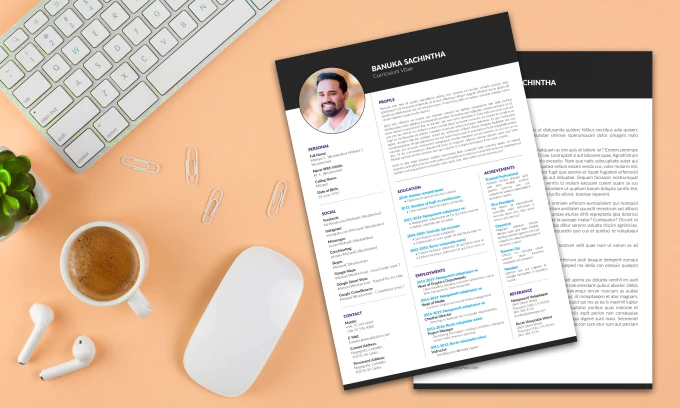How long should a resume be? Find out the ideal resume length for your situation using this guide. Soon, you’ll know the optimal number of pages for your resume.
What is the ideal resume length? Some professionals advocate for “1 page,” while others argue that “it depends.” Why the discrepancy?
Times have changed. In the past, fax machines were prevalent, and pages often got lost like socks in a dryer. Nowadays, with email and Applicant Tracking Systems, submitting longer resumes has become more manageable. However, this doesn’t mean we’re in a free-for-all situation where resume length is unrestricted. Let’s finally determine the appropriate number of pages for a resume.
This guide provides solutions to the following questions:
- What is the ideal length for a resume?
- How many pages should a resume consist of based on your level of experience?
- Ways to manage and control the length of your resume.
- Strategies for balancing resume length with your achievements.
What is your English level?
Find out your A1 A2 B1 B2 C1 C2 level of English with our online test and receive your English certificate.
What is the ideal length for a resume?
Typically, an effective resume ranges from one to two pages, contingent on your level of experience. Resumes extending to three pages are suitable for candidates with over 25 years of consistent work experience, such as executives, or for specific cases like an academic CV or a medical resume.
For more specific guidelines, consult the table below. While it may not offer an exact length for every resume, a brief review will provide insights into the appropriate length for crafting your resume.

What is the significance of resume length?
Here’s why resume length matters. Let’s say you’re a sales manager. You’ve worked two jobs, and achieved 7 really impressive things. (Like: Doubled revenue in 5 years.) You should be able to say all that in a single page. More “wow,” less words.
Is a One-Page Resume Always Necessary?
Opting for a one-page resume isn’t always the most suitable choice. Consider a scenario where you have an extensive list of accomplishments that cannot be easily condensed. Take, for instance, a project manager with a portfolio of 35 unique projects, each showcasing standout achievements. In such cases, having a three-page resume might be entirely justified.
What’s the Ideal Length for a Resume?
A resume can be concise, fitting onto one or two pages. However, the question arises: is a 3-page or even a 4-page resume too lengthy?
The key is to tailor your resume to the specific job requirements, showcasing relevant accomplishments that demonstrate your fit for the role. If you can effectively convey this in a single page, go for it. However, if a one-page resume seems insufficient for the depth of your experience in a particular field, feel free to expand and add more relevant achievements.
For positions requiring extensive experience, it’s acceptable for a resume to span a longer timeframe. If the job description specifies “3–5 years of experience required,” avoid listing 20 years of experience, as studies suggest that being overqualified may pose challenges in the hiring process. Focus on presenting only the experience that is directly relevant to the position.
What’s the Appropriate Resume Length for College?
For a college student’s resume, the ideal length varies. If you’ve accomplished extraordinary feats like solving Fermat’s last theorem, creating fusion in a lunchbox, or designing the wings of a dragonfly through logic, you might need a two-page resume or even longer. However, for the rest of us, a single-page resume template is generally sufficient.
Mastering Resume Length in Six Simple Steps
1.Modify Font Size, Spacing, and Margins
Certainly, you have the flexibility to reduce resume fonts, adjust line spacing, and manipulate margins. However, it’s crucial not to manipulate your resume layout to the extent that it resembles a dense sheet of black paper. While a slight increase in resume length is acceptable, it’s essential to avoid overwhelming the hiring manager with an excessive amount of text.
2. Substitute Responsibilities with Achievements
Here’s a valuable resume strategy: Steer clear of detailing all your responsibilities, as not only will it lengthen your resume, but it’s also uninteresting.
“Reduced inventory costs by 35%” outshines “Responsible for inventory management” any time. Therefore, carefully review the job description and highlight accomplishments that align with it.
3.Utilize Bullet Points in Your Resume
Include 3–5 bullet points for each job in your resume’s work experience section, with each bullet point spanning 1–2 lines. Assess whether you genuinely have sufficient noteworthy achievements to occupy 30 lines per job. If so, a two-page resume may be warranted. Ensure that the bullet points remain pertinent to the specific job offer at hand.
Are you C1 Advanced English?
Get your C1 Advanced English certificate now!
✓ Add your certificate to your resume
⭐ ⭐ ⭐ ⭐ ⭐
4.Keep it Concise and Direct
To echo the sentiments of JFK: inquire not about the ideal resume length, but rather, consider how to sustain its intrigue. Avoid getting mired in lengthy descriptions of responsibilities. Our HR statistics report reveals that managers typically skim resumes, often in less than 7 seconds. Be succinct and focus on showcasing your achievements.
5.Include Only Pertinent Details
If I’ve mentioned this previously, it’s worth emphasizing. Refrain from incorporating anything into your resume that doesn’t elicit a “Wow” from the hiring manager.
Construct your resume with accomplishments that demonstrate you’ve essentially mastered the job already. This approach ensures your resume remains concise and compelling.
6.Condense Resume Descriptions
Avoid redundancy in your achievements. Instead of repeating similar accomplishments individually, consolidate them. For instance, state that you trained over 20 employees in methodologies such as Lean, Agile, and Six Sigma, utilizing a single bullet point.
What is your English level?
Find out your A1 A2 B1 B2 C1 C2 level of English with our online test and receive your English certificate.

I am Nilay, an experienced English Language Assessment Director at the International English Test, where I have been working full-time since February 2020. I specialize in helping people worldwide validate their English proficiency through comprehensive assessments and certifications.
Before joining the International English Test, I worked as a self-employed English Language Assessment Consultant from January 2015 to December 2019. During this time, I assisted companies and individuals in improving their language skills, helping them achieve their academic and professional goals.
I hold a degree in Engineering and have also studied at Shafston International College in Australia. My educational background has equipped me with the tools to make a meaningful impact in the field of English language learning. Additionally, I enjoy sharing my expertise through articles that explore effective teaching methods and language assessment strategies, contributing to the International English Test and the broader assessment community.





